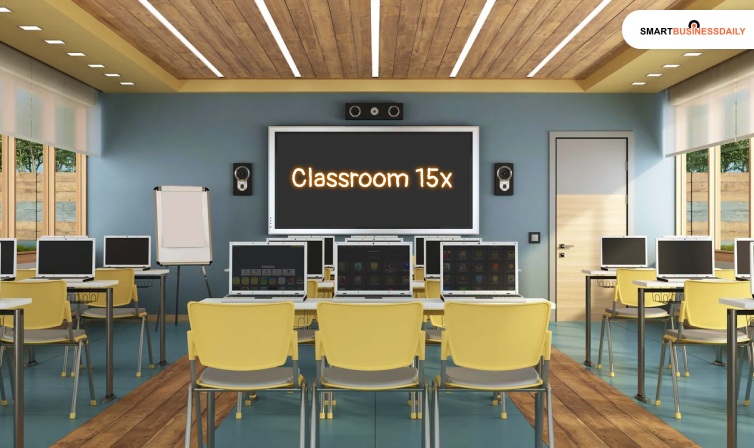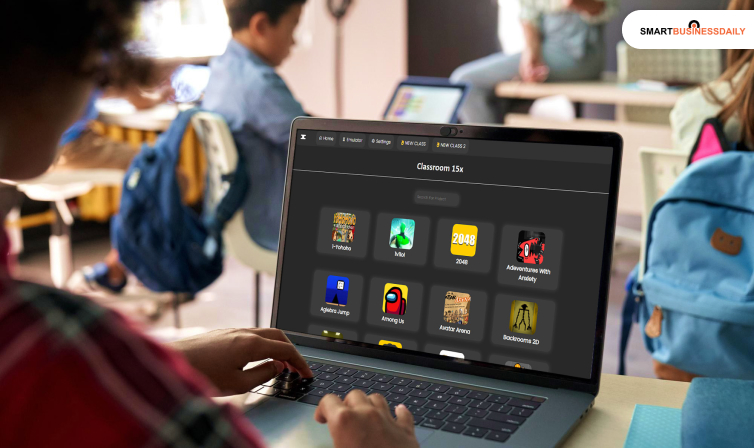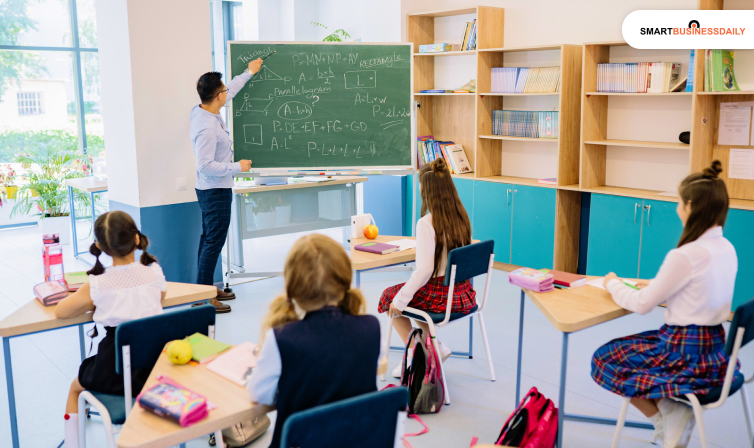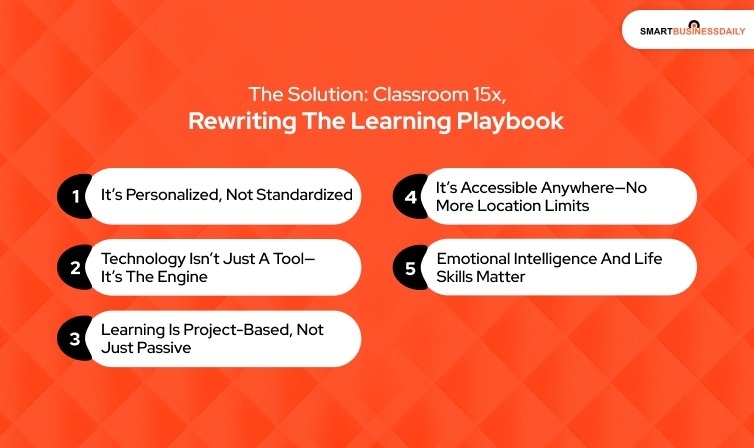Classroom 15x: Essential Tips for Enhancing Student Interaction and Learning
6 Mins Read
Published on: 11 May 2025
Last Updated on: 12 September 2025

- What Is Classroom 15x?
- The Problem: Why Are The Traditional Classrooms Falling Behind?
- How Does The Classroom 15x Can Be A Better Solution To This Issue?
- It’s Personalized, Not Standardized
- Technology Is Not Any Kind Of Simple Tool!
- Learning Is Project-Based
- It’s Accessible Anywhere!
- Emotional Intelligence and Life Skills Matter
- Classroom 15x vs. Traditional Education: A Quick Snapshot
- Who Stands To Benefit From The Classroom 15x?
- For Students:
- For Teachers:
- For Schools:
- For Parents:
- How Is It Being Integrated In The Real-World Education?
- What Are The Major Challenges Related To Classroom 15x?
- What You Can Do to Support the Shift?
So? Are We Still Teaching Like It’s the ’90s?
Let’s be real—most schools haven’t changed much in decades. Sure, we’ve swapped chalkboards for smartboards and added a few tablets here and there, but the overall approach? Still heavily based on memorization, tests, fixed schedules, and rigid curricula.
Meanwhile, the world outside the classroom has been flipping upside down. We’ve got AI tools writing essays, teams working remotely across time zones, and kids learning to code from YouTube.
It begs the question: Why hasn’t education caught up?
That’s where Classroom 15x comes in. It’s not just a shiny new tech program—it’s a reimagination of what learning should look like in the 21st century and beyond.
What Is Classroom 15x?

At its core, Classroom 15x is an educational model built for exponential impact. The “15x” stands for a bold goal: to amplify student learning, engagement, and success by 15 times compared to traditional classrooms.
It’s a model that doesn’t ask students to fit into outdated molds. Instead, it molds itself around them, with
- Tech,
- Personalization,
- Real-world projects,
- Emotional intelligence, and
- Global accessibility is baked into the design.
Let’s unpack how it works and why it’s making waves.
The Problem: Why Are The Traditional Classrooms Falling Behind?

Before we get into the good stuff, let’s quickly look at what’s not working in the current eduaction system!
To be honest, the Standardized tests still rule. However, they don’t measure real skills like creativity or collaboration.
Secondly, the students are often bored, anxious, or disengaged because the learning material feels irrelevant. This can lead to a massive gap in the students ‘ learning sessions.
Thirdly, the teachers are stretched thin, juggling huge class sizes, grading overload, and administrative pressure.
Along with that, you can have better access to quality education is still wildly unequal across regions and income levels.
The result? A generation that’s talented and tech-savvy—but stuck in an education system built for a different era.
How Does The Classroom 15x Can Be A Better Solution To This Issue?
Rather than patching up the old model, Classroom 15x builds a new one from the ground up. Here’s how it flips the script:

It’s Personalized, Not Standardized
Gone are the days of one-size-fits-all education. With Classroom 15x, each student follows a custom learning path tailored to their interests, pace, and strengths.
How?
- AI-powered tools assess learning styles and adapt lessons accordingly.
- Students choose topics that fascinate them, sparking genuine curiosity.
- Pacing is flexible—no one is left behind or held back.
Whether you’re a budding coder or a visual artist, your education finally fits you, not the other way around.
Technology Is Not Any Kind Of Simple Tool!
Classroom 15x isn’t about tossing a few iPads into the mix. It fully integrates technology as a core part of learning.
Students use:
- Adaptive learning platforms to master concepts at their own pace
- Virtual Reality (VR) to explore ancient cities or dissect a frog, without the mess
- Cloud-based platforms like Notion or Microsoft Teams for collaborative work
- Real-time dashboards to track their growth and set new goals
This kind of tech literacy isn’t just cool—it’s essential for future careers.
Learning Is Project-Based
Remember those school days filled with endless worksheets and lectures? Not in Classroom 15x.
Instead, students tackle real-world challenges that blend multiple subjects. Some cool examples:
- Design an eco-friendly home using principles from physics, math, and design
- Launch a startup concept complete with branding, budget, and marketing strategy
- Create a digital campaign to raise awareness about climate change
These aren’t just school assignments—they’re meaningful, creative endeavors that prepare students for life outside the classroom.
It’s Accessible Anywhere!
Another major plus? Classroom 15x is built for global access.
- Firstly, there are Live and on-demand lessons that make learning possible from any location.
- Secondly, you will have multilingual materials available offline for low-connectivity areas.
- Thirdly, the students in rural communities or developing countries can receive the same quality of education as those in major cities.
This model puts equity at the forefront—and that’s a game-changer.
Emotional Intelligence and Life Skills Matter
Let’s be honest—algebra’s great, but being able to handle stress, communicate well, and manage your time? That’s what sticks.
Classroom 15x makes social-emotional learning part of the weekly routine. Think like this! You will need these four things, and that’s a must! This holistic approach helps kids grow not just as students, but as people.
- Mindfulness sessions and guided journaling
- Conflict resolution roleplays
- Group discussions on empathy and inclusion
- Workshops on leadership, time management, and goal setting
Classroom 15x vs. Traditional Education: A Quick Snapshot
Let’s do a side-by-side comparison to see how they stack up:
| Feature | Traditional Model | Classroom 15x |
|---|---|---|
| Curriculum | Fixed and standardized | Flexible and interest-driven |
| Tech Use | Minimal or outdated | Fully integrated and essential |
| Teaching Style | Mostly lectures | Student-led, teacher-supported |
| Assessments | Standardized testing | Project-based and ongoing |
| Access | Classroom-bound | Global and online-friendly |
| Emotional Learning | Often ignored | Built into the curriculum |
Who Stands To Benefit From The Classroom 15x?
Classroom 15X is not a single, defined product. It is a conceptual educational framework that combines various modern teaching approaches.
Thus, different groups stand to benefit from the implementation of its core idea. This includes flexible learning spaces, technology integration, and personalized teaching.
The beauty of Classroom 15x is that it works for everyone in the education ecosystem.

For Students:
- More freedom, more fun, less stress
- Real-world skills they can actually use
- Stronger sense of purpose and self-confidence
For Teachers:
- Evolve from task managers to learning coaches
- Get actionable insights through learning data
- Spend more time inspiring, less time grading
For Schools:
- Stand out as forward-thinking and tech-ready
- Improve student engagement and retention
- Attract passionate educators and curious families
For Parents:
- Transparent insight into their child’s progress
- A chance to be more involved in learning
- More flexibility in how, where, and when their kids learn
How Is It Being Integrated In The Real-World Education?
This isn’t just an idea on paper—Classroom 15x-style programs are already in motion. Hybrid schools combine online content with hands-on learning labs. Youth entrepreneurship incubators teach teens how to launch businesses
Moreover, nonprofits use blended models to serve underserved communities. Summer programs tackling hot topics like AI, robotics, and social impact.
And the early feedback? Higher student engagement, better problem-solving skills, and more enthusiasm for learning.
What Are The Major Challenges Related To Classroom 15x?
Let’s not sugarcoat it—rolling out Classroom 15x everywhere won’t be seamless. There are hurdles to overcome, like:
- Making sure teachers get the training and support they need
- Ensuring access to tech for students in underserved areas
- Balancing screen time with offline activities
- Aligning innovative content with national education standards
But we can solve these challenges with collaboration, investment, and vision.
What You Can Do to Support the Shift?
Curious how you can be part of this education revolution? Here are a few ideas:
First, if you’re a teacher, explore project-based or tech-integrated teaching techniques. You can implement carious project based learning or PBL. These can help to develop open-ended real-world projects.
This would make it easy for you to challenge the students to investigate and further solve the complex issues.
Other than that, you can also use technologies like Quizz or Magic school AI to customize both assessment and lesson plans.
Second, if you’re a parent, ask your school about personalized learning programs or tools. You must keep yourself informed about mastery-based learning that allows students to make a progress through adaptive learning platforms.
You can also advocate for the investments in various digital tools such as LMS or leanrinbg management systems or the collaborative spaces like Google workspace.
Third, if you’re a student, advocate for more flexible and creative learning options. You can also request for peer teaching opportunities. Here, one student will be suggested to choose a specific time to teach a concept to the rest of the class.
This can strongly help to reinforce both learning while fostering a great collaboration.
Fourth, if you’re a policymaker or school leader, consider piloting a Classroom 15x-inspired program. You can invest in various evidence based teaching tools.
Moreover, you can also help in developing the pedagogical strategies along with the technologies.



















Comments Are Closed For This Article